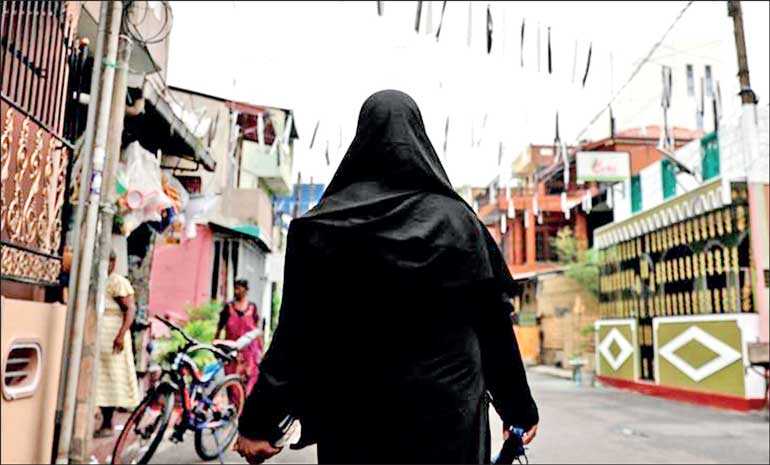Wednesday Feb 18, 2026
Wednesday Feb 18, 2026
Wednesday, 1 May 2019 00:00 - - {{hitsCtrl.values.hits}}

A decision to ban face coverings a week after more than 250 people were killed in a series of coordinated attacks on Easter Sunday has drawn a mixed response, with activists saying the move “violated Muslim women’s right to practice their religion freely”.
The law that takes effect from Monday did not specifically name burqas, niqabs or hijab worn by many Muslim women. A burqa is an outer garment that covers the entire body and the face, a niqab is a veil that also covers the face, while a hijab covers only the hair.
“The ban is to ensure national security... No one should obscure their faces to make identification difficult,” a statement from President Maithripala Sirisena said on Sunday.
Many in Sri Lanka, including the All Ceylon Jamiyyathul Ulama (ACJU), the top body of Islamic scholars in the South Asian island nation, have backed the move on security grounds.
The group had earlier issued guidance asking Muslim women to avoid wearing face veils in the public, but added it was opposed to legislation.
Sheikh Arkam Nooramith from ACJU said his organisation has discussed the issue with the Ministry of Justice.
“We had asked that we are given some more time, and whatever concerns that the ministry has – with regards [to] what is possible within religious norms we will guide the Muslim community,” Nooramith told Al Jazeera.
Muslims form nearly 10% of the South Asian nation’s 22 million population.
Al Jazeera spoke to a range of Sri Lankans, including Muslim women, on an issue that is dividing opinions in the Indian island nation.
Qaanita Razeek, 33, co-founder of Soup Kitchen Sri Lanka which helps the destitute, regardless of race/religion, wearer of niqab: While I understand that there is a difference in scholarly opinion about the wearing of the face veil, I made the choice to wear the niqab 16 years ago and asking me to unveil now is like asking to strip me of my identity.
Looking at the larger picture and the purpose with which I want to live my life, staying home is not an option for me, and I am trying to figure out a way around this.
Harshana Rajakaruna, Member of Parliament from the ruling United National Party: I feel that the majority of the Muslim community are very positive and happy about the ban.
I have spoken to members of the Muslim community, they say: “We never had this culture [of face veils] in Sri Lanka, this is something that has come to our community through influences of the last 10 to 15 years.”
Zainab Hussein (not her real name), a prominent social activist based in Colombo, wearer of hijab: In the current context, I don’t think there is anything much we can do to show resistance against this ban. However, the worry is the precedent that the law is setting.
There are schools of thought emerging against the hijab and other parts of Muslim female attire.
I understand however, how avoiding the niqab would help with easing some of the fears – but will the vigilantes stop at what the government has prescribed [i.e. banning only niqab] or will they go further?
We are already seeing overstepping. Both the government and the Muslim community have to do a lot of communications to ensure that this works smoothly.
Kalana Senaratne, senior lecturer, Department of Law, University of Peradeniya: The banning of the burqa/niqab is to be welcomed especially if this marks a shift in Sri Lankan society towards a more secular ethos.
If the banning is motivated by hate, it would have a very negative impact especially on the Muslim community in the long-term.
Security cannot be enhanced merely by banning the burqa/niqab. It has to be linked to the broader objective of secularisation of Sri Lankan society, which in turn requires other ethnic and religious groups, including the Sinhala Buddhist majority, to rethink and reform their own communities in more progressive and pluralist ways.
Tehani Ariyaratne, women’s rights activist: Any ban on the niqab without consultation with those who would be directly affected by it, is nothing but a reactionary response by the state, designed to distract from its woeful lack of accountability for the events that have taken place over the last week.
Muslim women and Muslim women’s right groups and activists have not been consulted in the process of putting this ban in place.
This is unacceptable. It is a violation of their right to practice their religion freely, and they should be the principle stakeholders in this discussion.
Instead, once again, Muslim women are sidelined in decisions that affect their own lives.
(Source: https://www.aljazeera.com/news/2019/04/sri-lankans-share-views-face-veil-ban-190429120515773.html)